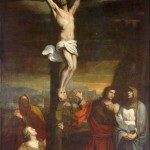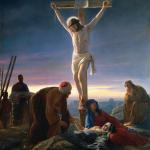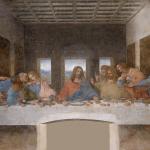Today I’m going to depart a bit from the standard patriotic fare you might be reading around the blogosphere and instead offer a special entry in our ongoing “Questions and Answers” series (which I kicked off last month here). The two tunes we’ll be looking at may not be in the same vein as “God Bless the U. S. A.,” but in their own way, they are quintessentially American. I encourage you to think about the lyrics with me today, and I think by the end you may find that they are actually quite appropriate.
The “question” for this entry comes from an artist whose name practically defines “America” — Simon & Garfunkel. So, how appropriate to be featuring their song “America.” This is one of Paul Simon’s greatest songs, an inspired marriage of lyrics and music that remains as fresh and moving as the day it was written. It is one of only a handful from his Simon & Garfunkel years that he seems willing to look back on and grudgingly admit was not so very bad…for young work. It tells an imaginary tale (not rooted in any fact according to Simon) of two young lovers who decide to “marry their fortunes” and “walk off to look for America.” The lyrics are written in the first person from the perspective of the young man, and the girl he is addressing is named after Paul’s then-girlfriend Kathy. Though there is no rhyme scheme, the waltz-like rhythm and rich imagery keep the poetry flowing, while somehow maintaining an easy, conversational tone.
Paul Simon is the kind of writer whose songs tend to speak for themselves so eloquently that any sort of analysis usually feels like an exercise in gilding the lilies. Nevertheless, we shall give it a go here… right after savoring Simon & Garfunkel’s definitive rendition (lyrics):
We catch up with our two lovebirds as they board a greyhound in Pittsburgh, stocked up on “cigarettes and Mrs. Wagner pies.” Where are they bound? They seem to be traveling east, towards New York. The speaker “hitch-hike[d] from Saginaw,” and by the end of the song he’s “counting the cars on the New Jersey turnpike,” which leads to Simon’s home state. But it becomes clear as the song progresses that this search is more about the looking than the finding, and the characters are looking for much more than “America.” By the time they’re out of laughs, out of games and out of cigarettes, they realize there’s nothing left to do. This leads into one of the most beautiful bits of the song:
So I looked at the scenery
She read her magazine
And the moon rose over an open field.
“Kathy, I’m lost” I said
Though I knew she was sleeping
“I’m empty and aching, and I don’t know why…”
Just that one simple line, “I’m empty and aching, and I don’t know why,” contains so much poignant power. It sums up the restless, unsatisfied spirit of 60s youth from which the song initially sprang, but it reaches beyond the generations. Indeed, it is the heart’s cry of every lost human soul, every traveler without a home. And as the speaker looks out and counts the cars on the New Jersey turnpike, he projects his restlessness onto their passengers: “They’ve all come to look for America.” Like himself, they are in a constant state of searching. But they still haven’t found what they’re looking for.
As Christians, we can pinpoint that inexplicable state of longing as a God-given desire for our eternal home. Paradise was lost when man fell. Creation has never forgotten. We sense that this world is not our home, because we were not made for this world. At the same time, we have found our rest in Christ. This means that even while in one sense our hearts are still restless for the coming eternity, we are no longer restless like the seeker who is empty and aching without knowing why. We can have assurance, confidence, and even contentment no matter where we are.
This spirit of contentment is embodied in Rich Mullins’ song “Here in America.” Let’s watch its concept video (lyrics):
It is clear that Mullins is an American who loves his land. It’s in his blood, a part of himself: “Once I went to Appalachia, for my father, he was born there.” The lyrics are full of location-specific references to her natural beauty—the Appalachian mountains “waking with the innocence of children,” the Atlantic ocean “crashing on the coasts of North New England.” The same beauty that the speaker in “America” seems to take for granted as he listlessly watches the moon rise, Mullins treasures with child-like eagerness. He is “looking” everywhere he goes. On the official website for his lyrics, it cites Genesis 13:17 as the inspiration for the lyric: “Go, walk through the length and breadth of the land, for I am giving it to you.”
But he understands the discontented seeker. He’s watched thousands of them, “on a million exit ramps… waiting for four-wheeled messiahs to take them home again.” Then comes the key line, which is unexpected because it makes the most sense as a sudden shift of address from Mullins’ audience to God (and every version of the lyrics I’ve found online confirms that this is indeed how it was written): “But I’m home anywhere, if You are where I am.” The video shows humorously that Mullins himself was a free spirit, not unaccustomed to hitch-hiking or playing for coins in the street. In fact, one of the funniest things about it is that a good chunk was filmed on location in Ireland, not America. It’s clear that in physical terms, his home was constantly changing. And yet he found that “home” was not defined by a place. It was defined by the Holy King who created him and loved him—and loves him still. The speaker in “America” is discontented because he feels like he doesn’t belong where he is, but he believes there’s nothing else. Rich Mullins was content because he knew he didn’t belong where he was, but he knew where he did belong, and he knew who was preparing that place for him.
As we remember our earthly country’s birth on this day, mournful for how she has fallen yet thankful for the ways God has revealed Himself to us through her beauty and her people, may we take hold of the Holy King’s promise as surely as he did.













